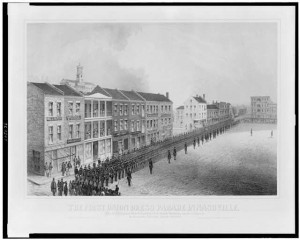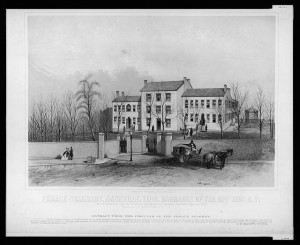thank goodness for malaria and bad roads and the loss of Nashville and …
From the Richmond Daily Dispatch March 5, 1862:
The Prospect ahead.
The public mind of the entire South is fast recovering from the causeless panic occasioned by the unfortunate affairs at Roanoke Island and Fort Donelson. Considerate men see that much ultimate good may come of them, by inuring us to defeats that must often occur in a war with a power possessed of inferior numbers and superior resources of all kinds, by curing us of that rashness which our continued successes had begotten,–and, most of all, by stimulating enlistments, and thus increasing the numbers and efficiency of our armies. It is now almost certain, that by the 1st of April we shall have a larger disposable force in the field than that of our enemies; for they must retain two hundred thousand men in Maryland to guard and retain that State and the City of Washington, a hundred thousand in Kentucky and Missouri to hold those States, some twenty thousand in their various forts, and probably eighty thousand in their fleets.
Thus, their stationary force being four hundred thousand, even if their armies number seven hundred thousand, they will have a disposable force of only three hundred thousand with which to invade our interior; and, in long incursions, this will be diminished at least one third by the forces detailed to keep up communication with their bases of operation. Besides, by deferring their invasion of the South until the warm season, they will soon decimate their ranks by the malarious diseases of our climate.
Heretofore we have had to fight against superior numbers, but so soon as they quit their vessels, march into the country, and meet us in the open field, we shall outnumber them, if we please, in every conflict.
They cannot probably hold Nashville longer than the rainy season keeps the Cumberland river flooded. We know not how large an army they have there, but believe it cannot be very large. Should we be mistaken, and they attempt to hold it permanently, we ought in a few weeks to make prisoners of their whole army. Their present occupation of that city, of Fort Donelson, and of Clarksville, so divides their land and naval force as to disable them from attacking and taking Columbus, and proceeding down the Mississippi to Memphis and the cotton region.
If, with their whole land and naval force, and their eager appetite for cotton, they durst not attempt to descend that river, they will surely not now venture to do so with a crippled and divided navy and army. It may yet turn out that the fall of Fort Donelson and of Nashville will be a great gain to us, and a great misfortune to them. The whole country, from the Ohio to Nashville, is inhabited by brave men and zealous Secessionists. They cannot make that city a base of operations from which to invade the Cotton States, for in a few weeks, probably days, the Cumberland river will become unnavigable for the smallest gunboats, and they would be cut off from their Northern supplies and resources. If they attempt it even with a force of a hundred thousand men, we should at once surround them with a force of a hundred and fifty thousand, and capture their whole army. This would end the war; and we should not be surprised that it should end somewhat in this way. The North, under weight of debt and want of cotton, is becoming desperate, and will rashly quit its wooden walls ere long and march far into our interior. Then we will make prisoners of their armies, and gloriously and triumphantly wind up the war. Let faint-hearted people recollect that we never yet met them with equal numbers in the open field without defeating them, and that under the levy en masse which is now going on in the South, if they invade us by land after the 1st of April, we will meet them with superior numbers.–Our bad roads will prevent their invading us sooner.
I think there is logic in the Dispatch’s arguments, but one of the big variables 150 years ago was when the Union was going to decide it had enough.
As far as the “levy en masse” goes, the Dispatch is full of notices offering $50 bounties for volunteers. It is said that the first Conscription Act in the CSA was passed on April 16, 1862, but there is evidence that at least the threat of a draft was a motivation in March 1862. From the same issue of the Richmond Daily Dispatch:
A Card.
–The undersigned expects to fill up his company in a few days, with the best material, and those disposed to unite with him had better do so at once. To be a volunteer is a noble, proud position. To be a drafted, forced, coerced, militiaman, is almost disgraceful, when it is remembered that we are engaged in the defence of our homes and all we hold most dear in life.
Meetings will be held at my office (Law Building) next Wednesday and Saturday nights, at 8 o’clock. …
W. W. Parker, M. D.



Pingback: Big Demand for Saltpetre | Blue Gray Review